
 Highly Recommended **** Profiles Theatre is producing two series of one act plays on alternating nights under the titles “Vices and Virtues”, but there are plenty of both in each. That said, as a theme, Vice, or at the least potentiality for it, wins by a very thick strand of hair, even in Virtue. Mercifully, the first play in each series is tamer than its successors, prepping us gently for the oncoming intensity. The unifying theme of both plays is the situational judgements and character assessments we make, and their dissimilarity to what we believe we are “supposed to feel.” Sometimes this happens at end, in the middle, or most unsettling in the beginning, because in the last case we usually retain them long past an appropriate point as the nuances of the play unfolds. This conceit perhaps reaches an epitome in “Virtues” counterpart, “Vice,” but there is plenty to see here as the plays increasingly prepare us for what is to come should we chose to attend again the following night to and watch even more social orthodoxies concerning censorship, gender, boundaries, sexuality, exploitation, and relationships be repeatedly upended, forcing us to be either uncomfortable, thoughtful, offended, or enraged. I felt all these sensations during Virtues, and especially Vices, and each feeling was satisfying, affecting, and cathartic.
Highly Recommended **** Profiles Theatre is producing two series of one act plays on alternating nights under the titles “Vices and Virtues”, but there are plenty of both in each. That said, as a theme, Vice, or at the least potentiality for it, wins by a very thick strand of hair, even in Virtue. Mercifully, the first play in each series is tamer than its successors, prepping us gently for the oncoming intensity. The unifying theme of both plays is the situational judgements and character assessments we make, and their dissimilarity to what we believe we are “supposed to feel.” Sometimes this happens at end, in the middle, or most unsettling in the beginning, because in the last case we usually retain them long past an appropriate point as the nuances of the play unfolds. This conceit perhaps reaches an epitome in “Virtues” counterpart, “Vice,” but there is plenty to see here as the plays increasingly prepare us for what is to come should we chose to attend again the following night to and watch even more social orthodoxies concerning censorship, gender, boundaries, sexuality, exploitation, and relationships be repeatedly upended, forcing us to be either uncomfortable, thoughtful, offended, or enraged. I felt all these sensations during Virtues, and especially Vices, and each feeling was satisfying, affecting, and cathartic.
Virtues begins with “Good Luck in Farsi.” A play about two actresses (Sarah Brooks and Sarah Ruggles) who duke out professional and personal jealousies concerning looks; talent; success; and their respective abilities as they wait for an audition, leading to a betrayal that represents the epitome of unprofessional cruelty. Their performances are comic and their characters less realistic than the those in the other plays, but I have found that actors have universal difficulty in playing other actors within plays, and the fact that most of their character’s lines had to be delivered insincerely and sarcastically surely made it even more difficult. Also, the slightly caricatured performances were mitigated by how well they fit with play’s lighter, funnier, mood, and I loved hearing Brooks and Ruggles deftly handle the timing of their thinly disguised, highly charged, dialogue in which they made phrases like “break a leg” sound menacingly literal.
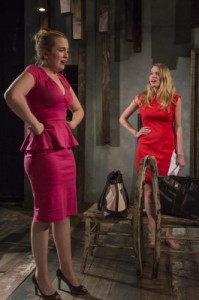 Virtues quickly turns darker in its second play, Romance, in which a stalker (Nik Kourtis) tracks down his estranged ex-lover (Patrick Gannon), ultimately resulting in the possibility of a meaningless one night stand together. Somewhat strangely, I sympathized with Kourtis’ character from the beginning, due in large part to his exceptionally convincing performance as an emotionally unsettled man racked with passion, a feeling of betrayal, anger, and nervousness so intense that I feared it would turn into psychosis or even violence. Not to mention the fact that his infatuation, determination, and passion were all met by Gannon with a stony silence even as it became increasingly clear that there were situations for which Kourtis’ character deserved answers, despite his ex-lover’s decision to sever all ties. Here, my judgement felt vindicated as the defects in Gannon’s character became clear and which greatly exceeded stalking caused by hopeless-unrequited love. However, I suspect it was meant to have what in poetry is called a “turn” to see if and when the audience would switch sides because I think most members will have an initial visceral gut reaction against a stalker, no matter how consummately, convincingly, or compassionately his pathologies are portrayed, and will finally side with him only towards the very end. This was the certainly the case for me in later plays.
Virtues quickly turns darker in its second play, Romance, in which a stalker (Nik Kourtis) tracks down his estranged ex-lover (Patrick Gannon), ultimately resulting in the possibility of a meaningless one night stand together. Somewhat strangely, I sympathized with Kourtis’ character from the beginning, due in large part to his exceptionally convincing performance as an emotionally unsettled man racked with passion, a feeling of betrayal, anger, and nervousness so intense that I feared it would turn into psychosis or even violence. Not to mention the fact that his infatuation, determination, and passion were all met by Gannon with a stony silence even as it became increasingly clear that there were situations for which Kourtis’ character deserved answers, despite his ex-lover’s decision to sever all ties. Here, my judgement felt vindicated as the defects in Gannon’s character became clear and which greatly exceeded stalking caused by hopeless-unrequited love. However, I suspect it was meant to have what in poetry is called a “turn” to see if and when the audience would switch sides because I think most members will have an initial visceral gut reaction against a stalker, no matter how consummately, convincingly, or compassionately his pathologies are portrayed, and will finally side with him only towards the very end. This was the certainly the case for me in later plays.
Unfortunately, Virtues one man play “Kandahar” interrupts the production, never succeeding on its own terms, nor in what the other plays manage to do. A soldier (Drew Halliday) addresses the audience as though it is some sort of military tribunal and tries to justify a heinous, civilian, crime by citing his war experience and asking us if we have ever killed a man in combat, guaranteeing us that most of us have whether or not we will confess it. He is unable to successfully make the connection between violence in battle and the violence he is on trial for perpetrating. Instead, he blames it on women from beginning to the end, never offering any reasonable (or unreasonable) justification for the accusation, making it impossible to sympathize with him at any point in the play, and undermining its effect in relation to Virtues other play’s. Nor was Halliday’s performance ever able to compensate for the poor script. His movements and dialogue looked and sounded highly affected, passionless, and ineffectually understated. (But never in a deliberate or disassociate way). That said, he made eye contact with the audience in a fashion that was visceral, human, and absolutely incredible. I felt like his character was looking me directly in the eye with dread and hopelessly pleading to be heard and acquitted.
Thankfully, “10k” brings us straight back in to the plays unifying thematic conceit. Two strangers (Tom McGregor and Betsy Bowman) have a conversation as they run through a forest. McGregor seems to begin the conversation, flirting with her, and telling her highly inappropriate things about his wife and his relationship with her that could easily be considered attempts at seduction. We feel that she is threatened and wonder if she feels the same thing. However, as they continue she responds in kind and talks about her own faults which border on the criminal. The man is non-judgmental. Yet we still remain on her side and suspect him right until the very end when McGregor’s character finds himself in a dilemma and ultimately does the right thing, acquitting himself with grace, gentleness, honor, and compassion. McGregor successfully portrays awkwardness in his motions and manner of speaking while still remaining a credible husband and father with a wife that is struggling. Bowman is the model of fitness who we can easily believe craves exercise, nature, solitude, and companionship which supersedes her instincts and obligations as a mother. The play was cleverly blocked (Director: Andrew Root) making the motion of running convincing, but still accomplishing artistic meaning by having each character fall behind the other when they were the one revealing a failing in their life or showing a possible lapse of character.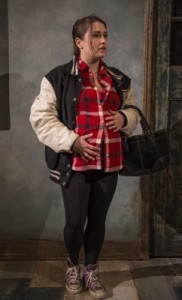
The second to last play, “Grabbing Bicycles,” prepares us for Virtues shocking finale more than anything we have yet seen. It concerns a Tony award winning playwright (Rob Grabowski) is miffed when the director of a benefit (Laura Berner Taylor) about censorship asks him to change the title and scenes in his script about a religious figure as a young boy and adult man which includes scenes of him engaging in an orgy, albiet “very tastefully with shadow puppets” ostensibly out of fear that the audience will take offense. It immediately conjured up images of Matt Stone and Trey Parker’s commercially successful and Tony Award winning musical the Book of Mormon and Scorsese’s artistically triumphant film “Last Temptation of the Christ,” the latter having provoked considerable controversy both from the title and similar but more tasteful material in the 1980’s. With these successes in mind, we are initially outraged that Taylor’s character would try to censor a playwright’s play that he wrote pro-bono for a benefit against censorship, but when the complexity of the situation is revealed we begin to feel her concerns run deeper and are more legitimate, despite the fact that the fundamentals have not changed. Grabowski is convincing as a disheveled, comic, artist and has good chemistry with Taylor: the reasonable, professional, trying to articulate something which normally would sound perfectly reasonable.
The best or worst (depending how one choses to look at it) is saved for last in which Adam Soule plays a haughty, arrogant, condescending and concerned father named Kip and Tim Curtis plays Bill an avuncular, kindly, man who Kip quite reasonably suspects of being a pedophile with an inappropriate interest in his son. Soule is so good at being so thoroughly unlikable and Curtis at being kindly, innocent, and child-like that we side with Bill even as his story begins to unravel, and are forced to ask ourselves whether sex-offender registries protect the public children or are the ultimate scarlet letter preventing rehabilitation and therefore posing a greater threat. It’s a question don’t want to ask and one that is difficult to answer even at the last moment in this play’s shocking conclusion.
Virtues runs through March 6, 2016. Productions are Fridays and Saturday’s at 8 pm, and Sundays at 3 pm. Its counterpart Vices runs on Thursday at 8 pm, Saturdays at 3 pm, and Sundays at 7 pm. Performances are at Profiles theatres Alley Stage located at 4147 N. Broadway. Regular Tickets are $40. Student and Senior Tickets are $35. If you have previously purchased tickets to Virtues counterpart, Vices, you will receive a $10 discount. Group rates are available. To purchase them please contact www.profilestheatre.org or call the box office at 773-549-1815.
As in Virtue, the first one-act play of Neil LaBute’s Vices, “Happy Hour,” nudges us gently (at least in relation to the other plays) intothe the serious and heavier themes of its sucessors. Two strangers meet in a night club, a woman called Cleo (Eleni Pappageorge), who suggests a one night stand to a man called Ted (Brennan Roche) even though he is straightforward about the fact that he is engaged. She perisists, however, relying on the fact that he is quickly going from tipsy to drunk and flirts with him, attempts to seduce him, and cruelly threatens him by implanting a variety of dangerous possibilites in his mind about the the situation in which he finds himself.
Both Pappageorge and Roche give highly convincing performances and their dialogue and interaction feels natural and believable, despite the oddity of the situation. Because of the difficulty of doing five one act plays in on evening, the set (Greg Penoneault), lighting (Michael Rathburn), and sound (Brandon Reed) design of Vices are often basic and static for the purpose of feasibility, leaving differentian between the different play’s settings and mood to the talented costume designer (Uriel Gomez) who consistently delivers. However, perhaps under Kay Martinovich’s direction, all the technical qualities in this particular play were superb, creating a highly convincing ambience of a place with loud music, heavy alcholol, dim lights, secret flirting, and the possiblity of sex.
After this gentle nundge, it is straight on to full intensity. I The second play, “Im Going to Stop Pretending That I’m Not Hurting You” may have pushed the limits of creduility, but that did nothing to lighten the emotionally charged script and or the believability of Marie Weigle and Brookelyn Heberts’ performances. The talent of Labute’s writing who, as he does so often with these plays counterparts in Virtues, switches our sympathies from one character to another half-way through the play. This time it begins with a woman trying to break up with her longtime girlfriend who just won’t let go. Her girlfriend’s continuing demands for information and explanations seem increasingly inappropriate, bordering on harrassment or stalking. However, how our understand the situationation ultimately switches utterly and totally as they discover that she has made the ultimate sacrifice for this woman whom she loves. At one point, the her ex-partner calls it “a very big step,” but that doesn’t really cover the extremity of what the other woman did for her, and the fact that she didn’t try and stop her. By the end, we felt that she deserves anwsers, but she never gets them as the details emerge and the play progresses towards its ending with extremely cruelty draped in the trappings of tenderness.
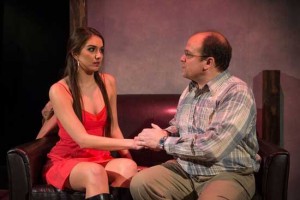 As with the one act play in Vices, I felt that “Totally” was underwhelming and a serious interuption to momentum of the production as a whole, despite stronger writing. An older teenager (Tamara Chambers) addresses the audience as though we were a single friend which was not a convincing conceit. In a gossipy style, she tells us the intimate details of her life and her motives and actions are cosnistently believable and intense. However, the chatty style was the only area in which I thought Chambers cultivated a convincing character, who otherwise felt flat and superficial, despite the fact that this woman, however openly and gossipingly she may talk, is leading a very serious life in which she is a playing a very dangerous game. That said, she did handle what I like to call the “turn” in these plays, beautifully, giving off a visceral feel of quiet terror, intense uncertainity, and at least the possibility of remorse after she reveals what she hitherto concealed from us. Unfortunately, this twist occurrs at the very end so she didn’t get the opportunity to build on the momentum of this consumately acted moment.
As with the one act play in Vices, I felt that “Totally” was underwhelming and a serious interuption to momentum of the production as a whole, despite stronger writing. An older teenager (Tamara Chambers) addresses the audience as though we were a single friend which was not a convincing conceit. In a gossipy style, she tells us the intimate details of her life and her motives and actions are cosnistently believable and intense. However, the chatty style was the only area in which I thought Chambers cultivated a convincing character, who otherwise felt flat and superficial, despite the fact that this woman, however openly and gossipingly she may talk, is leading a very serious life in which she is a playing a very dangerous game. That said, she did handle what I like to call the “turn” in these plays, beautifully, giving off a visceral feel of quiet terror, intense uncertainity, and at least the possibility of remorse after she reveals what she hitherto concealed from us. Unfortunately, this twist occurrs at the very end so she didn’t get the opportunity to build on the momentum of this consumately acted moment.
I have to say that the surprise in “The Great War” is not as shocking as the others perhaps because Labute’s made the characters so unsympathetic. However, LaBute may be setting us up for the next and last play in the series which was certainly the most disturbing and difficult to consume. There is still plenty of emotion is this play in this play a couple (Elizabeth Birnkrant and Brian Goodman) act like George and Martha in Whose Afraid of Virginia Woolf if they had the children that they so desperately wanted, but decided to call in quits 10 years into the marriage when they find their offspring to be what they consider mediocre. It may that director Jeff Gamlin, Birnkant, and Goodman had this in mind as they drink, fight, and torment each other while partially playing an argument about custody. Not only do they continually drink and spar as they hash out the details of who gets the children and when, but sometime’s their verbal fencing seems like an almost like cruel form of flirting. Whether or not the connection with Albee’s play was intentional, the similar feel attest to the ability of subtly of Gamlin’s direction and balance both speaks to Birnkrant and Goodman’s skills as actors. 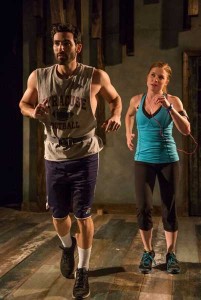
Fittingly, the last play in Vices is the most intense of either these plays or their counterparts in Virtue, and will push the audience’s ability to a digest situation which upends conventional orthodoxies (across the entire political spectrum), and endure what slowly reveals itself to me the most shocking and horrible of situations. Director Joe Joharus superbly blocks and directs the actors so that the play unfolds in natural, suspenseful, slow and mysterious way. Near the beginning when the prostitute’s (Marilyn Bass) client (Steve silver) hands her the fee in particular denominations of cash and says “just the way you like it,” it anticipates what is nots your usual relationship between a john and a lady of the night. While the acting may not reach the height of some of the other performances in Virtues and Vices, they handle this difficult one-act play well, especially after its “turn” (it was way to serious here to use the phrase twist). Before we wonder just what is going as Bass’s character increasingly seems to be cruel, exploitive, and pressuring her client into sex, and is it turns out, sexual taboo’s. Fortunately, this play does end with tenderness that helps relieve some we’ve just had to digest, especially if we’ve attended previously attended Virtues.
Vices runs through March 6, 2016: Thursdays at 8:00 pm, Saturdays at 4:00 pm followed by its counterpart Virtues at 8:00 pm, and Sundays at 8:00 pm preceded by its counterpart at 3:00 pm.It produced is by Profiles Theatre and takes place in its Ally Stage located at 4147 N. Broadway in Chicago.tickets are 40 dollars for all perfomances, but there is a 10 dollar discount if you have scene Virtues a previous evening. All student and senior tickets are 5 dollars of the regular price. Group rates are available. To purchase visit www.profilestheatre.com or call the box office at 773-549-1815. Parking is available from 14-16 dollars at the 4100 N. Clarendon: one blook East of the theatre.
The best or worst (depending upon how one looks at it) is saved for last. Kip (Adam Souel)

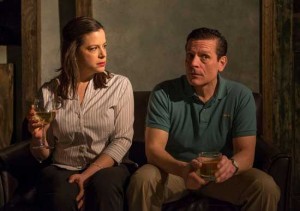



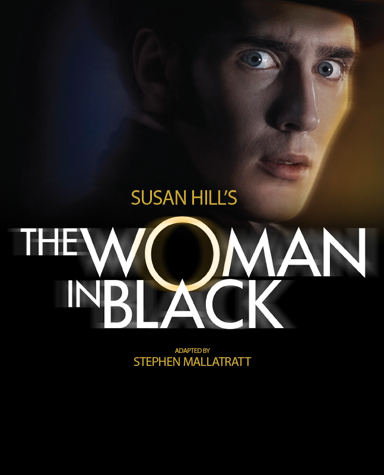

More Stories
“The Woman in Black” MILWAUKEE reviewed by Amy Menzel
“The Man Who Came To Dinner” reviewed by Julia W. Rath
” Manual Cinema’s The Magic City”